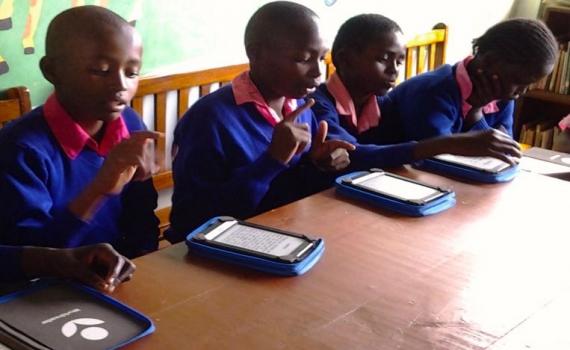
COMMUNITY NEED
In many parts of Kenya, special needs children struggle with barriers to education. In 2015, when Meru public librarians visited special needs schools, they found that the schools had limited educational resources and no computers for the children to use.
THE INNOVATIVE PROJECT
With a small matching funds grant from the EIFL Public Library innovation Programme (EIFL-PLIP), Meru Public Library created the ‘Promoting inclusive education through training of children with special needs’ service.
The service takes tablet computers pre-loaded with educational content related to the Kenyan primary school curriculum to help the children to study, and e-readers with over 1,500 books to special needs schools. Librarians teach the children to use the technology to study, to do their schoolwork and to practice reading.
In May 2016, after consulting with parents and carers, the library launched the service in four schools: Kaaga School for the Deaf; Thimangiri Rehabilitation Centre for Children with Autism; Meru GK Prison’s nursery for children, and Ark international Children’s Home, which supports orphans, homeless and other vulnerable children.
Impressed by results, enthusiastic parents formed a Special Needs Support Club to raise funds in the community to expand the service. In July 2016, funds raised by parents enabled the library to include two more special needs schools, Mwithumuiru and Gikumene.
Librarians responded to particular needs at different schools. For example, at Kaaga School for the Deaf, librarians taught children to use the tablet computers and e-readers to access the educational content and books. Using sign language learnt from Kaaga teachers, they test the children’s knowledge in fun activities like quizzes. At Thimangiri school for autism, librarians used tablets, because they found the children enjoyed interactive stories and games.
“After being trained with the tablet computer, using the applications with phonetic sounds and songs, my son, started improving and right now he can write three-letter words like cat, bat, mat, and so on. His memory has improved gradually and I believe it will keep improving. I am asking the library to lend us the tablet so that he can use it at home with my guidance. - Evans Mutuma, parent
EIFL-PLIP PROJECT TIMELINE
May 2016 – March 2017
ACHIEVEMENTS AND IMPACT
The library’s educational outreach service -
- Pioneered a public library education service for children with special needs, reaching over 160 children in six schools, improving their communication skills and self confidence;
- Raised community awareness about the importance of inclusive education;
- Led to a special bond with parents: the parents’ Special Needs Support Club continues to meet in the library every month, and to fundraise to sustain and expand the educational service. One of the parents, a special needs teacher, now volunteers at the library to work with special needs children.
- Created and resourced a ‘Special Needs Corner’ in the library - a dedicated space where children can use computers and e-readers, and where teachers, parents and carers can find information in print and online about issues affecting special needs children.
- Built librarians’ skills in working with special needs children.
- Inspired two other libraries - in the towns of Kilifi and Thika - to start similar outreach services for special needs children in their communities.
MORE PUBLIC LIBRARIES SUPPORTING EDUCATION
Read about more innovative public library services supporting education of children and adults. PLIP-EDUCATION





